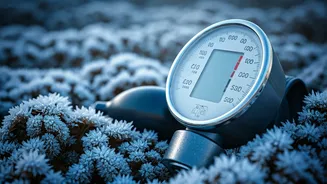Winter's Impact
Winter's chill can indeed have noticeable effects on your body's systems, especially your cardiovascular health. Blood pressure, the force of blood against
your artery walls, tends to increase when the weather turns cold. This is because, in an attempt to conserve heat, blood vessels constrict, or narrow. This narrowing makes it harder for blood to flow, which in turn leads to a rise in blood pressure. Another factor is that we tend to spend more time indoors during winter, often with less physical activity. This can contribute to weight gain and further increase blood pressure. Moreover, the body's natural circadian rhythm can also play a role, as hormonal changes related to seasonal variations can influence blood pressure levels. Understanding these winter-related mechanisms is important for taking preventative action to support your cardiovascular health.
Constricted Vessels
One of the primary reasons for increased blood pressure during winter is the constriction of blood vessels. When exposed to cold temperatures, the body's natural response is to narrow the blood vessels to preserve heat. This process, called vasoconstriction, reduces the space through which blood can flow. As a result, the heart needs to work harder to pump blood through these narrowed vessels, leading to increased blood pressure. Blood vessel constriction is particularly noticeable in extremities like hands and feet, which feel colder during winter. This natural response has a significant impact on blood pressure and may require proactive efforts to manage blood pressure effectively. People who have existing health conditions must be extra careful, monitoring blood pressure during this time.
Reduced Activity
Winter often leads to a decrease in physical activity, further contributing to higher blood pressure levels. With colder temperatures and inclement weather, many people tend to spend less time outdoors and engage in less exercise. Regular physical activity plays a critical role in maintaining healthy blood pressure because it helps improve cardiovascular function and promotes healthy blood flow. When physical activity decreases, it can lead to weight gain and a decline in overall cardiovascular health, which in turn increases blood pressure. Exercise helps relax blood vessels, thus reducing blood pressure. To combat this, it's important to find ways to incorporate exercise into your routine, even during winter. This can include indoor activities like home workouts, gym visits, or engaging in winter sports like ice skating or skiing.
Dietary Shifts
Winter's influence extends to our eating habits, where dietary changes can indirectly affect blood pressure. The colder months often bring about changes in food choices, with many people gravitating towards richer, heavier, and often saltier meals. Increased salt intake is closely associated with higher blood pressure because salt causes the body to retain water, increasing blood volume and placing more pressure on blood vessels. Additionally, the holiday season can bring celebratory meals that might include more processed foods and sugary treats, which can negatively impact blood pressure. Maintaining a balanced diet with an emphasis on fresh fruits, vegetables, and lean proteins, and reducing sodium intake, is crucial for managing blood pressure during winter. Careful attention to your diet and incorporating heart-healthy foods can counteract the negative influences of winter's dietary patterns.
Vitamin D Levels
Vitamin D deficiency, common during winter due to reduced sun exposure, can also affect blood pressure. Vitamin D plays a crucial role in vascular health. It helps regulate blood vessel function, and a deficiency can contribute to increased blood pressure. Sunlight is a primary source of vitamin D, and during the winter months, with shorter days and more time spent indoors, the body's natural vitamin D production can be suppressed. Vitamin D deficiency can impact the renin-angiotensin-aldosterone system (RAAS), a hormone system that regulates blood pressure. To counteract this, consider supplementing with vitamin D, especially if you live in a region with limited sunlight during winter. Regular vitamin D intake, along with dietary sources like fatty fish and fortified foods, helps maintain healthy blood pressure.
Prevention Tips
Taking proactive steps can help manage and reduce blood pressure during winter. Regular monitoring of your blood pressure is the first and most crucial step, especially if you have a history of high blood pressure or other cardiovascular conditions. Ensure you consult with your doctor. Maintaining regular exercise is crucial, even when weather conditions limit outdoor activity. Finding indoor alternatives such as home workouts, or using gym facilities, keeps the cardiovascular system healthy. Focus on a balanced diet, limiting sodium intake and incorporating heart-healthy foods such as fruits and vegetables. Consider consulting with a nutritionist to create a tailored dietary plan. Ensure you stay hydrated as dehydration can also affect blood pressure. Adequate hydration is important year-round, so drink plenty of water.












